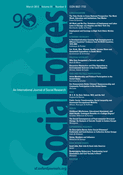-
Views
-
Cite
Cite
Annette Bernhardt, Michael W. Spiller, Diana Polson, All Work and No Pay: Violations of Employment and Labor Laws in Chicago, Los Angeles and New York City, Social Forces, Volume 91, Issue 3, March 2013, Pages 725–746, https://doi.org/10.1093/sf/sos193
Close - Share Icon Share
Abstract
Despite three decades of scholarship on economic restructuring in the United States, employers' violations of minimum wage, overtime and other workplace laws remain understudied. This article begins to fill the gap by presenting evidence from a large-scale, original worker survey that draws on recent advances in sampling methodology to reach vulnerable workers. Our findings suggest that in America's three largest cities, violations of employment and labor laws are pervasive across low-wage industries and occupations, affecting a wide range of workers. But while worker characteristics are correlated with violations, job and employer characteristics play the stronger role, including industry, occupation and measures of informality and nonstandard work. We therefore propose a framework in which employers' noncompliance with labor regulations is one axis of a competitive strategy based on labor cost reduction, contributing to the reorganization of work and production in the 21st century labor market.



